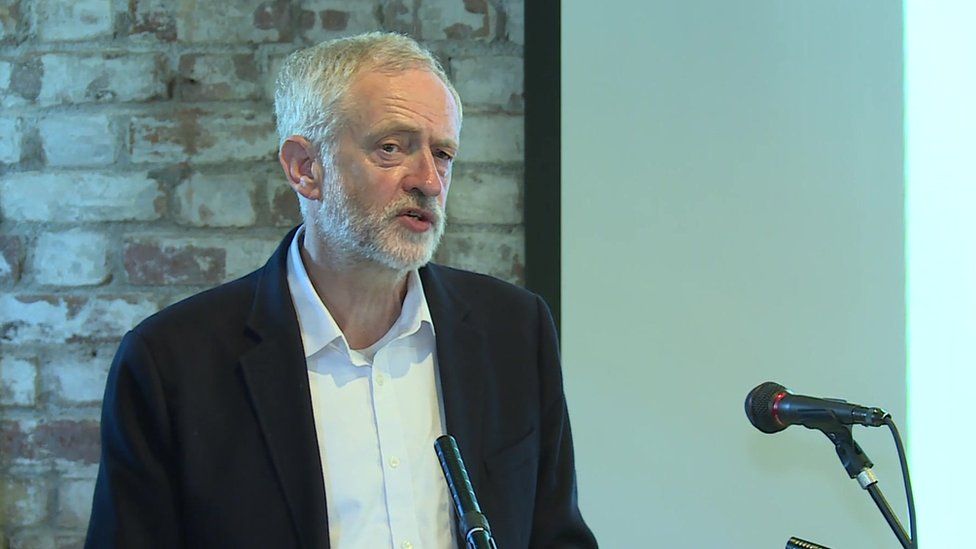Jeremy Corbyn proposing digital 'bill of rights'
- Published

Mr Corbyn said faster broadband was helping to "repopulate" parts of the UK
Every home and business in the UK would have guaranteed access to high-speed broadband as part of a digital "bill of rights" proposed by Jeremy Corbyn.
In his Digital Democracy Manifesto, external the Labour leader said slow broadband was a "barrier to learning and a source of social and economic exclusion".
Providing a truly universal UK service across would cost £25bn, he said.
Mr Corbyn pledged to "democratise the internet" if he took power, including consulting on online election voting.
Speaking in Shoreditch, Mr Corbyn also argued his leadership campaign's use of new technology would be a model for a future general election campaign and represented the party's "path to victory" in 2020.
The Labour leader is using social media to appeal to activists, particularly younger voters, in his fight against challenger Owen Smith.
The winner of the contest will be announced on 24 September.
Mr Corbyn's surprise election as Labour leader last year was credited in part to his team's use of phone canvassing technology, which helped volunteers contact potential voters.
The Corbyn campaign is drawing on technology used by Bernie Sanders in the US
Speaking in Shoreditch, Mr Corbyn highlighted further technical innovations by his supporters, including a new canvassing app inspired by Bernie Sanders' US presidential bid, which he will say is transforming grass-roots political engagement.
"The creativity of the networked young generation is phenomenal," he said.
"We have thousands of young volunteers on our campaign taking part in this digital revolution. We will channel this new energy and creativity into Labour's general election campaign whenever it comes.
"It is in this way that Labour can get back into government. Labour, under my leadership, will utilise the advance of digital technology to mobilise the most visible general election campaign ever."
Digital manifesto
Launching a seven-point digital democracy manifesto, written by policy adviser Richard Barbrook, Mr Corbyn said universal high-speed broadband and mobile access at affordable prices was "essential" to supporting far-flung communities in Scotland, Wales and England and to enabling businesses to trade and diversify.
Criticising disparities in broadband speeds and 4G mobile phone coverage in both rural and urban areas, he said BT and other fibre optic cable providers must continue to commit to universal access under current regulation and, if they didn't, he was "open-minded" about bringing the network into public ownership.
Mr Corbyn said people should be able to have their own citizen digital passport
Pressed for more details, he said a National Investment Bank to be established under a future Labour government would underwrite the rollout of a universal network - backed up by a universal service obligation for a minimum connectivity speed enshrined in law.
"The investment of £25bn in it seems to me to be money extremely well spent that will help to reduce the levels of regional imbalance and regional inequality in Britain.
"In some parts of the country, he said, "people have laid their own broadband cable because farmers were fed up with being unable to quickly access the internet to get a reasonable price or sell their products".
In an effort to extend and protect individuals' internet rights, the Labour leader made the case for a voluntary scheme of digital passports to provide internet users with a secure and portable identity for their online activities.
Calling for the public to have a greater stake in digital ownership, he said publicly-funded software and hardware should be made available to programmers under an Open Source licence and the state should invest in new websites and applications to reduce the cost of connecting consumers with online services.
Broadband speeds
The government has been consulting on introducing a Universal Service Obligation for broadband connectivity, which would give everyone the legal right to request a connection at a minimum speed - proposed to be 10 Mbps - by 2020.
Ministers have said huge progress has been made towards ensuring everyone has access to high-speed broadband - defined by the industry as a minimum speed of 2Mbps (megabits per second) but which campaigners say should be set at at least 10Mbps.
An Ofcom report last December found 2% of UK premises - mostly in rural areas - were unable to receive speeds of at least two Mbps through a fixed line.
People living in hard to reach areas have been offered a subsidised satellite broadband connection if they could not get an affordable service of at least two Mbps.
Ministers say they are on track to hit their target of securing 95% superfast broadband - defined by the government as greater than 24 Mbps - by next year. Other bodies define superfast broadband as a speed of at least 30 Mbps.
Lib Dem Alistair Carmichael said that Mr Corbyn's words on wanting to stop "unwarranted snooping" were "empty" ones because Labour had "swung behind the Tories supporting an expansion of the state's surveillance powers" with the Investigatory Powers Bill.
- Published3 August 2016
- Published27 July 2016
- Published15 June 2016